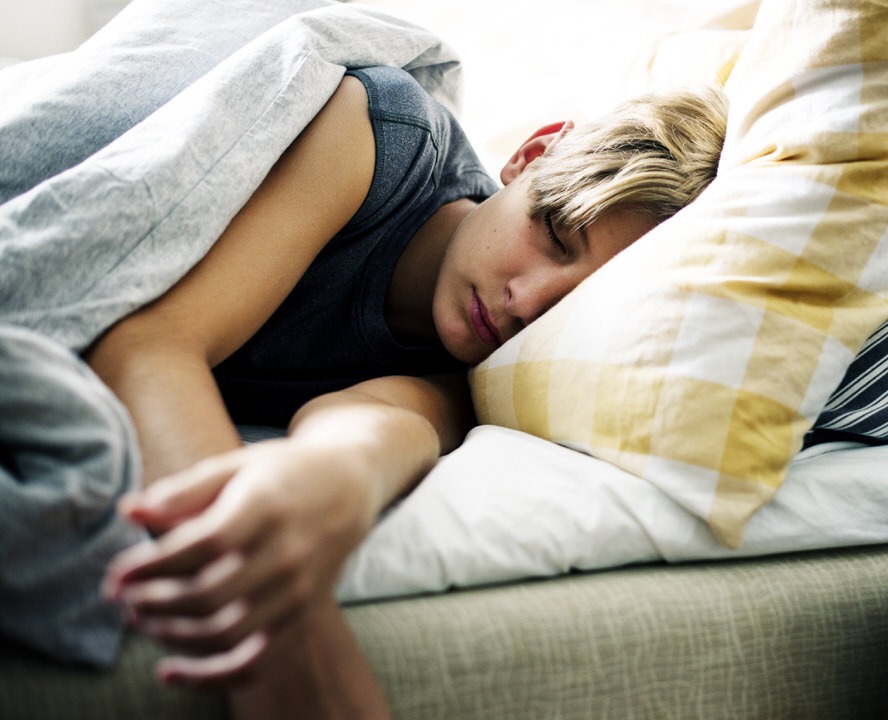A Better Nights Sleep for Teens
A quote from one of my favourite classic films, “Forest Gump”, beautifully sums up not only what life may throw at you, but what parenting teenagers can be like – “a box of chocolates, you never know what you’re gonna get!” Whether yours is soft and gooey, a bit chewy or hard as nails, teenagers come in all shapes and flavours, but include one common ingredient… hormones, which can play havoc with our little darlings! Spots may erupt, moods might swing faster than a pendulum on a pirate ship, and sleep… well teens have a canny knack of sleeping when they need to be awake and being awake when they need to be sleeping!
Sleeping difficulties often arise during the teenage years, if you’re the one propping open your eyelids at 11pm while your teen has more bounce than Zebedee, you’re not alone! Changes to their biological clock and their natural sleeping cycle (circadian rhythm) mean that teenagers tend to feel more awake and alert later in the evening and more tired in the morning. While it’s reassuring to know that your teen’s changing sleep pattern is partly down to their biological clock, other factors such as the pressures of increased homework, looming exams, friendship ups and downs and a whole host of roller coaster emotions can also have an effect on your teen being able to switch off and relax at night.
Supporting your teen through these challenging years by encouraging them to try and maintain a reasonably healthy sleep routine may be more important than you think.
In this article I’m going to explore the importance of sleep for teenagers and how not getting enough sleep can have a detrimental effect on their physical as well as their mental health.

How much Sleep do Teenagers need?
According to Julius Patrick, Lead Sleep Physiologist at the Bupa Cromwell Hospital, teenagers should get around 8-10 hours of sleep each night, however most teens aren’t getting enough of their much needed shut eye.
The National Sleep Foundation revealed that only 15% of teens reported sleeping 8.5 hours on a school night, which leaves a whopping 85% who aren’t!
Patrick highlights;
“Teenagers often get a bad reputation for sleeping in late or staying in bed all day. But what if all those weekend lie-ins and hours spent under the duvet are more important for your teenager’s health than you realise?”.
There’s an increasing body of evidence showing the negative effect on children and young adults who get less sleep than they need and that poor sleep habits from an early age can lead to long term sleep problems, but just how important is it for your teen to get their recommended dose of ZZZ’s each night?
Why Teenagers need Sleep
A simple analogy is that sleep is food for the brain, during sleep vital body and brain activities are occurring, getting quality sleep is essential for a teenager’s growth and development. While sleep may be the last thing on your teen’s mind here are just a few reasons why getting their recommended quota of sleep is good for them;
- Maintains good mental health
- Boosts their energy levels
- Improves their learning and concentration
- Maintains a healthy body
- Keeps their immune system working well
- Builds up their long term memory
On the contrary, lack of sleep can make it harder for your teen to regulate their emotions and may also lead to;
- Lack of concentration
- More prone to spots and other skin conditions
- Irritable and aggressive behaviour
- Crave unhealthy foods leading to weight gain
- Increased use of caffeine or nicotine
- Low immunity
We can’t escape the fact that getting enough sleep is crucial during adolescence, there are clear proven benefits. Alongside the physical side effects that present with lack of sleep, being tired all the time can be a contributing factor to more serious mental health issues such as anxiety and depression.
Implementing a few boundaries at home may just be enough to help and encourage your teen to stick to a regular sleep routine, however, if you are concerned that your teen may be battling with something more serious than a few disturbed nights sleep then please seek further advice. Your family GP will be able to offer support and charities such as Mind are a wealth of information for mental health and well-being.
Why do Teenagers find it difficult to Sleep?
There can be a whole host of contributing factors that are keeping your teenager up until the early hours including;
- Watching TV, gaming, using social media
- Feeling stressed and anxious about school & exams
- Friendships, relationships & family life
- Drug or alcohol misuse
- After school jobs
Our modern and digital world has encouraged 24/7 activity with social media, gaming, memes and tik-toking often extending well into the night.
Whilst it’s easy to assume that your teen’s nocturnal tendencies are purely down to them having far more exciting things to be doing than sleeping, there are also some fundamental changes occurring within their internal body clock that begin playing havoc with their natural sleep pattern during adolescence.
Your teenager’s circadian cycle (a complex internal system that regulates our sleep/wake cycle within a 24 hour period) shifts during puberty, meaning that they naturally fall asleep later, sleep for longer and wake up later. Teenager’s may further disrupt their body clock by staying up even later at weekends and not emerging from their slumber until midday!
Research has also shown that teenagers don’t produce melatonin until later at night. Melatonin is a hormone that is produced by your body in response to darkness, it’s what helps us to feel tired and gets our body ready for sleep. A combination of the light from electronic devices used at night (that confuses your body and disrupts the production of melatonin, making it even harder to fall asleep) and this natural shift in melatonin production, hinders your teen being able to get off to sleep early.
It can feel like a bit of a vicious cycle, getting your teenager up at a reasonable hour is a necessity during school term time, but getting them out of bed before they’ve had enough sleep can lead to grogginess (known as sleep inertia). If this repetitive sleep deprived cycle continues for extended periods of time it can have a negative effect on their wellbeing.
Tips for Teens to get a Good Night’s Sleep
Helping your teen establish a healthy sleep routine will ultimately benefit both their physical and their mental health.
Mary Carskadon, Director of Chronobiology/Sleep Research at the E.P. Bradley Hospital says, “The earlier parents can start helping their children with good sleep habits, the easier it will be to sustain them through the teen years.”
While it may feel as though their hormones and our modern world are set against your teen getting off to sleep at a reasonable hour, try these sleep tips for teenagers to help them drift off;
Make their bedroom sleep friendly
Your teens bedroom will include things that either help or hinder their sleep. Making a few adjustments may help them to sleep better. For example, make it quiet, cool and dark, black out blinds can be good for the summer months when it’s much lighter at both ends of the day.
Establish a sleep routine
While it’s tempting for your teen to push their bedtime even later at the weekends, keeping to a regular bed and wake up time will help their body clock to stay reasonably consistent.
Limit screen time before bed
We’re all guilty of using our screens too close to bedtime, however the blue light that emits from electrical devices can disrupt the hormones that tell your body to go to sleep. Keeping TVs, phones, tablets and computers out of the bedroom is ideal or ask your teenager to stop using them at least an hour before they intend to go to sleep.
Encourage regular exercise
Exercise is proven to help you sleep as well as relieve stress and improve your mood. Encourage your teenager to partake in some form of daily exercise, however, keep the high-intensity exercise for the morning as if it’s done immediately before bed this could leave them feeling too energised and unable to sleep. Walking or Yoga are great for the end of the day.
Create a night-time ritual
There’s lots of talk about the benefit of creating a night-time ritual to help babies sleep – it’s equally as important for your teen. A regular bedtime routine will help your teen to prepare their body for sleep, whether it’s having a bath, reading a book or practising some mindfulness exercises, doing something relaxing before bed will help them to unwind.
Cut out the caffeine
Caffeine found in coffee, tea chocolate and fizzy drinks can stimulate your nervous system, suppress the production of melatonin (the sleepy hormone) and keep you awake. It can take hours for the body to process caffeine, so it’s best for your teen to avoid consuming caffeine late in the afternoon.
Eat a healthy, balanced diet
Eating a well balanced diet goes a long way in helping the battle for a good night’s sleep. Other factors such as not letting teenagers go to bed hungry or the opposite, going to bed on a full tummy can upset the effort in getting to sleep. Offering a wholesome snack a few hours before bed is recommended, be it a bowl of porridge or a banana smoothie.
Help them to be organised
Keeping on top of homework, making a to-do list and preparing their school things ready for the next day will all help your teen to be able to quiet their mind at bedtime. Also, keeping their bedroom reasonably tidy will promote a calmer environment when it comes to bedtime.
Ensure they have a comfortable bed & mattress
Sleeping in an uncomfortable bed certainly won’t help your teen achieve a good night’s sleep. If they’re still hunkering down in the same bed, on the same mattress, that they had since they were a tot, it may be time for a new teen bed.
Carskadon summerises;
“If parents and teens know what good sleep entails and the benefits of making and sticking to a plan that supports good sleep, then they might re-examine their choices about what truly are their ‘essential’ activities,”

If you’ve tried all the above and your teen is still battling to get off to sleep, don’t struggle on alone, there is further support available. The Sleep Council have lots of teen sleep advice and have also developed a teen sleep plan that you may find helpful.
Rest assured, once adolescence passes and your teenager’s hormones have settled down, sleep will hopefully return to a more regular pattern… but for now, savour your box of chocolates!
If you need any more hints, tips or help for selecting the perfect teen bed, contact our customer service team are a phone call +44(0)1305 231231 or email today.






